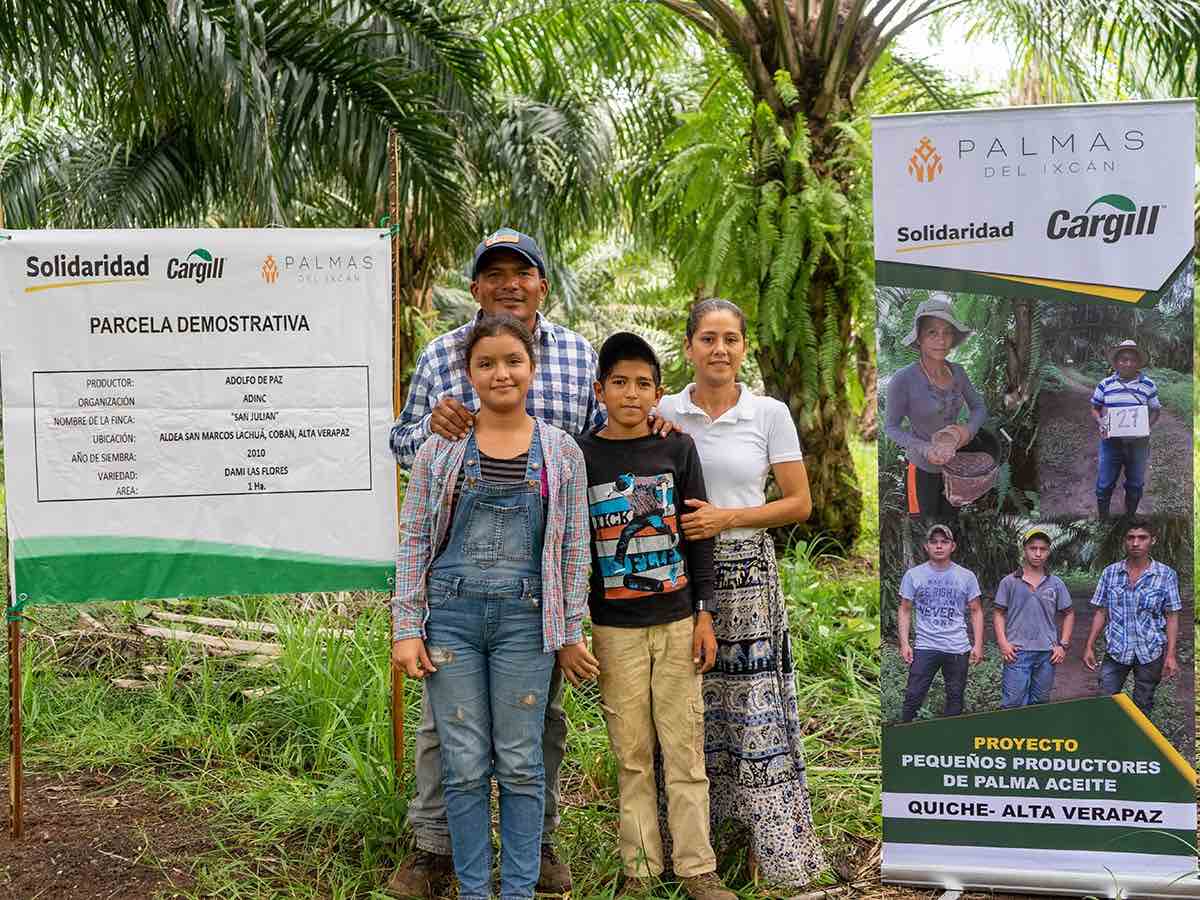Adolfo Paz is one of the small producers who, through the RSPO Certification Project in Guatemala, has learned about new good practices, for example taking care of the flora and fauna and riparian areas on his plot.
Solidaridad and Palmas del Ixcán, a palm oil producer company in Guatemala, have been supporting 105 smallholder producers in the Ixcán region, so they can pursue the Roundtable for Sustainable Palm Oil (RSPO) certification.
RSPO Certification Project in Guatemala builds smallholder producer capacities in Ixcán
The project started in 2019 and was launched in partnership with Cargill and Oleon, who support the production of differentiated and sustainable palm oil. Through farmer field schools, training workshops and technical assistance, Solidaridad and Palmas de Ixcán model good agricultural practices that help improve the productive performance of plantations and therefore increase the income of small producers.
Solidaridad conducts a socioeconomic evaluation with each smallholder producer to measure the results of the RSPO certification project in Guatemala.
"The idea is to promote a change to better agricultural practices, to generate a sustainable chain from beginning to end. Not only to seek the certification seal, but also to improve the living conditions for the producer," said José Luis López, oil palm and biodiversity manager in Guatemala for Solidaridad.
The field schools provide training to smallholders soil nutrition and other topics with the objective to increase their farms’ production.
The producers supported through this project are grouped into two organizations, the Association of Farmers for Integral Development and the "La Palma" Integral Commercialization Cooperative, as co-executors of the project. At the same time, they benefit from the project, since the idea is to strengthen their administrative capacities to empower themselves in the productive chain of the region.
Webinar shows mid-term results of the RSPO Certification Project in Guatemala
In July 2020, Solidaridad gathered 17 participants, including representatives of partners Cargill and Oleon, as well as the co-executors of the project, to present the mid-term results of the RSPO Certification Project in Guatemala.
The webinar included video testimonials from small producers, executive presentations showing project progress and an exchange between producers and other partners. Partners Cargill and Oleon were satisfied and confirmed their support for the project. Through this support, the partners validate that production chains can become sustainable.
Some of the key results reported in this mid-term presentation were:
-
12 demo plots established in smallholder producer plantations, where technical staff join producers to practice techniques learned and use appropriate tools and personal protective equipment
-
100% of smallholder producers with environmental assessments and management plans in place
-
43% of the 105 smallholders meet RSPO infrastructure requirements
-
workshops provided on environment, administration, national legislation, internal control procedures, among other topics, to understand and comply with the RSPO 2018 principles and criteria
-
83% of smallholder producers adopted the no deforestation, no peat, no exploitation policy
-
12 smallholders received the production incentive; 3 of them exceeded the goal of 22 tonnes of fresh fruit bunches (FFB) per hectare on average
-
20 youth (men and women) completed an oil palm management course
Palmas del Ixcán has included these small producers in its supply chain and has worked with them since 2009.
The demonstration plots allow RSPO Certification Project in Guatemala participants to use the techniques learned and experience results first-hand.
A step forward for RSPO certification in Guatemala
The project has promoted, among other components, compliance with national regulations for plantation development. To this end, after submitting the environmental impact assessments of small producers' plantations, the project acquired 91 environmental licenses on their behalf, issued by Guatemalan authorities.
According to “Landscape-scale Action for Forests, People and Sustainable Production: A Practical Guide for Businesses”, a publication issued by the Tropical Forest Alliance, acquiring the licenses represents an important milestone for RSPO certification in Guatemala.
The practical guide also recognizes Solidarity projects in Colombia and Ghana as examples of company participation in landscape initiatives or jurisdictional initiatives. Tropical Forest Alliance has made an interactive version of the publication available to the public.
Use of mobile technology to promote palm sector development and RSPO certification
Solidaridad uses technology to continue supporting smallholder producers to improve their living conditions through good sustainable practices. We have developed a digital tool called Farm Diary to help farmers maintain control of their management and administrative actions on the farm.
Farm Diary facilitates the adoption of good practices by small palm producers.
The Farm Diary app can record and interpret data in real time. It provides recommendations to farmers, allowing the farm’s decisionmakers to make better decisions.
In addition, Solidardidad is working on a new RSPO compliance checklist app for use by palm oil mills and smallholders. This tool for tracking and monitoring compliance with RSPO principles and criteria will complement the technical assistance we provide to close sustainability gaps and will help users achieve RSPO certification in Guatemala.
Learn more about how we engage producers with digital tools in the region.

